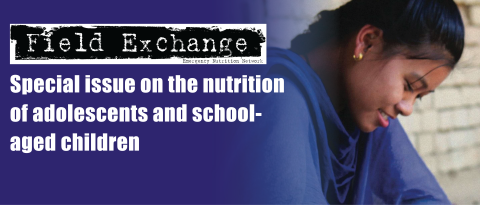Nutrition and health challenges for Rohingya and Bangladeshi adolescents and the impacts of the COVID-19 pandemic
This is a summary of the following two reports:
- Guglielmi, S, Jones, N, Muz, J, Baird, S, Mitu, K and Ala Uddin, M (2020) 'We didn't come here to eat. We came here to save our life': Health and nutrition challenges facing adolescents in Cox's Bazar, Bangladesh.' Policy Brief. London: Gender and Adolescence: Global Evidence.
- Guglielmi, S, Seager, J, Mitu, K, Baird, S and Jones, N (2020) '"People won't die due to the disease; they will die due to hunger": Exploring the impacts of covid-19 on Rohingya and Bangladeshi adolescents in Cox's Bazar.' Policy brief. London: Gender and Adolescence: Global Evidence.
Cox's Bazar in Bangladesh is home to over two million Bangladeshi citizens and some 860,000 Rohingya refugees. In Cox's Bazar, health services have limited capacity and unclear mandates for providing health services for Rohingya refugees. Furthermore, the COVID-19 mitigation strategies have heightened pre-existing nutrition and health challenges for both Rohingya and Bangladeshi populations, with this potentially disproportionately affecting the adolescent population.
Report one investigates the nutrition and health challenges pre-COVID-19 for Rohingya and Bangladeshi adolescents (10 to 19 years of age) in Cox's Bazar. The report is based on mixed-methods data collected between March and October 2019 as a part of the Gender and Adolescence: Global Evidence (GAGE) longitudinal study. The study surveyed 2,280 adolescents and conducted 149 in-depth interviews or focus group discussions with adolescents, their families, community leaders and service providers.
Report two features mixed-methods data collected between March and August 2020 from a sample of the Rohingya and Bangladeshi adolescents surveyed in 2019. The research consisted of 1,761 phone surveys with adolescents 10 to 19 years of age, 30 interviews with adolescents 15 to 19 years of age and seven key informant interviews. The report investigates the impact of the COVID-19 pandemic on Rohingya and Bangladeshi adolescents in the thematic areas of education and learning, bodily integrity, economic empowerment, health and nutrition and psychosocial wellbeing.
Pre-COVID-19 adolescents living in Cox's Bazar faced many challenges including food insecurity, age- and gender-based violence, disrupted educational prospects, widespread psychosocial distress and worry, limited health service uptake and inadequate health services for persons with disabilities. Rohingya adolescents were identified as a particularly marginalised subgroup. One of the most severe impacts of the COVID-19 pandemic was the increased levels of food insecurity faced by both Rohingya and Bangladeshi adolescents with stark gender differences – girls were 50-60% more likely to report hunger due to COVID-19 than boys. Within the camps, while accurate health information seems to have been efficiently disseminated early in the response, some adolescents have since been left without reliable and accessible information. Child marriage is still a worry among adolescents in the camps although there were reports of decreased pressure to marry at the time of the survey. Data also suggests that married girls may be at greater risk of gender-based violence than their unmarried counterparts during the pandemic. Additionally, the decision to define education as a non-essential activity and the closure of protection services exacerbated inequities in access to education in the camps and limited access to safe spaces for adolescents facing increased violence. Across Rohingya and Bangladeshi adolescents, there were reports of decreased paid employment opportunities and anxiety regarding the COVID-19 pandemic.
Due to the findings of these reports, the following recommendations have been made:
- Urgently tackle food insecurity through the scale-up of existing programmes, including in-kind food and voucher support.
- Resume education and vocational training programmes by increasing alternative remote programmes and renew efforts to initiate the Myanmar curriculum programme for grades six to nine.
- Strengthen awareness-raising, reporting and the mitigation of age- and gender-based protection risks during the COVID-19 pandemic.
- Address restrictions to digital connectivity in the camps to promote access to information and online learning.


